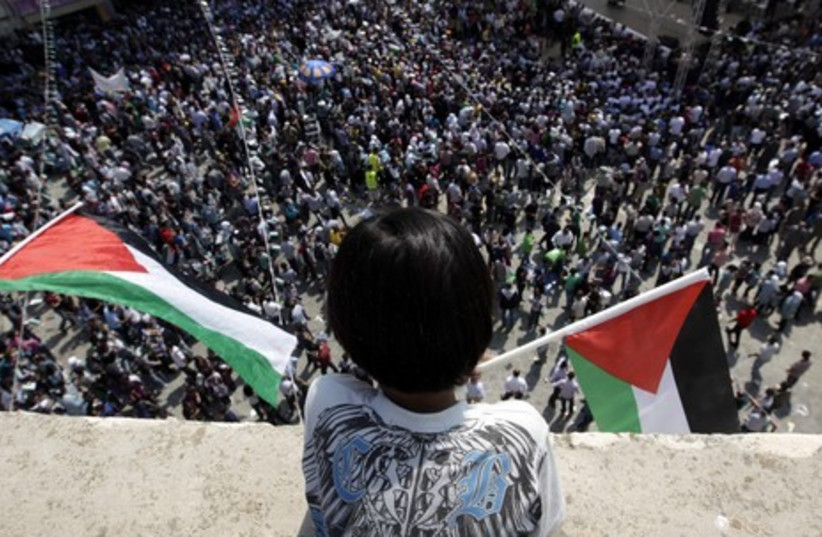The fear in their eyes is palpable. In a video released by the Hostages and Missing Families Forum on Wednesday, footage from Hamas terrorists’ body cameras captures the violent kidnapping of female IDF soldiers on October 7. The three-minute video, censored for its graphic content, shows these young women being forcibly taken from their base, their faces etched with terror and despair. Their cries for help and the brutal treatment they endure are stark reminders of the inhumanity inflicted upon them.
The families of the kidnapped soldiers released the video to highlight the ongoing nightmare of their loved ones. The footage shows the violent, humiliating treatment to which they have been subjected. Seven female soldiers were abducted; only two have returned, one rescued by the IDF and the other found dead. Fifteen others were murdered.
This harrowing reality raises a fundamental question: Should such barbaric behavior earn Hamas and its followers a sovereign state?
The path to statehood
The horrific events of October 7 remain etched in our collective memory. Hamas, a recognized terrorist organization, launched an unprecedented attack on Israel. In this brutal onslaught, 1,200 innocent people lost their lives, including women and children. Victims were not only killed and abducted; they were also subjected to heinous acts of violence. The images and reports of these atrocities have shocked the world, painting a grim picture of the true nature of Hamas and its affiliates. To respond to this carnage by recognizing “Palestine” as a state is an affront to justice and human decency.
Recognition of statehood is not merely a diplomatic gesture; it carries profound symbolic and practical implications. By recognizing Palestine now, Ireland, Norway, and Spain are effectively sending a message that the international community is willing to overlook or even excuse acts of terror when perpetrated against Israelis. This undermines the moral fabric of international law, which should hold all actors accountable for such egregious human rights violations.

The leaders of these countries argue that this recognition is necessary to revive the two-state solution and promote peace. However, this perspective is dangerously naive. A two-state solution cannot be achieved by legitimizing entities that engage in and support terrorism. It can only be done through sincere and peaceful negotiations, which Hamas has repeatedly shown no interest in pursuing.
The timing of this recognition is particularly troubling. It comes just months after Hamas’s brutal invasion and during the ongoing war in Gaza, which has caused immense suffering to both Israelis and Palestinians. By recognizing Palestine now, these European nations are effectively rewarding the very tactics that led to such widespread devastation. This decision undermines the efforts of those genuinely committed to peace and strengthens the position of extremists who thrive on violence and discord.
Israel has long argued that a unilateral recognition of Palestinian statehood without a final status agreement is counterproductive. It encourages those who believe that terror and violence are effective means by which to achieve political ends. This recognition serves as a dangerous validation of such beliefs, potentially enabling further acts of terror not just in the Middle East but globally.
The International community
Ireland, Norway, and Spain assert that their recognition of Palestine aims to open up new diplomatic avenues for peace. However, symbolic gestures that overlook ground realities cannot achieve true peace. Peace requires a commitment to dialogue, security, and mutual recognition of rights. It requires a Palestinian leadership that is willing to renounce terror and genuinely work towards coexistence.
The international community must recognize that the path to a two-state solution is fraught with complexities that cannot be resolved through unilateral actions. Israel has repeatedly shown a willingness to negotiate and make concessions for peace, but these efforts are continually undermined by acts of terror and unilateral moves that sideline genuine negotiations.
The international community has a crucial role to play in fostering peace between Israelis and Palestinians. However, this role must be played with a clear understanding of the realities on the ground. Recognizing Palestine in the aftermath of the October 7 massacre is not a step toward peace; it is a step away from it. It signals to terrorists that their actions can yield political rewards, thereby incentivizing further violence.
The decisions by Ireland, Norway, and Spain to recognize Palestine as a state at this juncture are deeply misguided. They disregard the harsh realities of recent events and reward a strategy of terror. True peace can only be achieved through mutual recognition, security, and sincere negotiations – not through unilateral gestures that embolden extremists.
